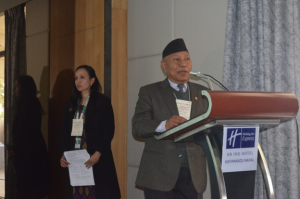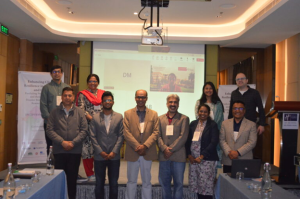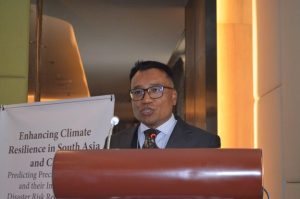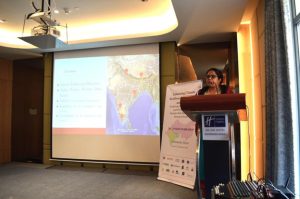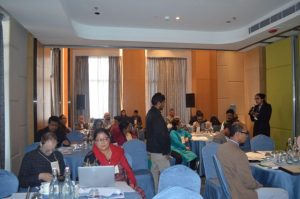16-17 Februrary 2025, Kathmandu, Nepal – The Small Earth Nepal (SEN) successfully conducted an inception workshop of the Asia-Pacific Network for Global Change Research (APN) project “Enhancing Climate Resilience in South Asia and China: Predicting Precipitation Shifts and Their Impacts for Disaster Risk Reduction and Resource Security (Project Reference Number: CRRP2024-06MY-Pradhananga)” at the Holiday Inn Express, Kathmandu, Nepal. The workshop aimed to outline the work plan and implementation strategies and discuss project sites among the collaborators from participating countries. The discussions focused on addressing climate-induced challenges through scientific research and the application of technological tools.
The opening session was chaired by Dr Madan Lall Shrestha, member of the Scientific Planning Group (SPG), APN, and an Academician at the Nepal Academy of Science and Technology (NAST), who emphasised the significance of regional cooperation and science-based policy making. Chief guest Dr Jagadishwor Karmacharya, Joint Secretary, Water and Energy Commission Secretariat (WECS), Government of Nepal, highlighted the role of artificial intelligence and machine learning in advancing climate modelling and prediction. Dr Linda Anne Stevenson, Acting Director, APN, emphasised impactful collaboration for meaningful action in her opening remarks. Her message was delivered on her behalf by Dr Dhiraj Pradhananga, Project Leader.
Dr Pradhananga, who also serves as the Chairholder of the UNESCO Chair in Mountain Water Sustainability, presented an overview of the project, its objectives and the approach methodology for its implementation. Following this, Dr Mandira Singh Shrestha, SEN Services, provided a technical introduction to the Coordinated Regional Climate Downscaling Experiment (CORDEX), a key tool that will be applied in the project to downscale and analyse climate models for precipitation analysis. This session was followed by a detailed discussion regarding the implementation of projects in each country involved.
A total of 37 participants–including researchers, collaborators, stakeholders from Bangladesh, Bhutan, India, Nepal, the USA and Pakistan– gathered to share insights on the local context, existing challenges, and best approaches to overcome the challenges. Discussions also emphasised the importance of adopting similar techniques and methodology for data collection and analysis. Collaborators from partner countries clarified their roles and responsibilities, set the timelines, and established a collaborative framework to ensure smooth implementation of activities across borders.
SEN, with support from the World Climate Research Programme (WCRP), provided hands-on training on CORDEX data and methodology to 16 in-person and over 45 online participants representing professionals, early career researchers and students in South Asia. The training enhanced the capacity of participants to analyse climate change projections using CORDEX regional climate model simulations.
The inception workshop played a vital role in launching this regional initiative. It facilitated knowledge sharing and capacity building while establishing collaborative targets to guide the project’s upcoming activities. Importantly, the inception workshop developed a clear roadmap and strengthened partnerships to generate impactful research to inform climate resilience strategies and policies across South Asia and China.
The regional project is a collaborative research initiative involving five countries: Bangladesh, Bhutan, India, Nepal and Pakistan, with support from the USA, Japan and China. The project’s objectives include analysing the temporal and spatial shifts in precipitation and phase changes, conducting vulnerability assessments, and enhancing the capacities of a new generation of climate scientists.
